Hurihanga āhuarangi me te hauora
Climate change, health & wellbeing
From rising temperatures to increased flooding, ESR is working to understand and respond to the consequences of climate change, to safeguard Aotearoa now and for future generations.



About
ESR is studying climate change impacts, where they will be most felt, who will be most vulnerable, and what adaptations Aotearoa will need.
Our expertise includes drinking water safety, water security, infectious disease, vector-borne disease, radiation and social systems.
We provide expert scientific advice to inform climate change planning, adaptation and mitigation initiatives. We look at how systems behave over time, to interpret how the interactions between environment, health, culture and society affect the wellbeing of individuals, communities and the country.
This transdisciplinary approach is essential to understanding the direct and less obvious impacts of climate change. Our work addresses the needs of policy makers, funders, and decision makers, equipping them with crucial information to steer climate change responses and safeguard the welfare of our society.
Health systems & adaptation
Health systems & adaptation
The effects of climate change will be wide ranging and are expected to have impacts directly and indirectly on human health and the health system. In order to maintain and improve health now and for future generations, countries need to build resilient health systems to protect people, particularly the most vulnerable, from the health risks related to natural hazards, disaster events and climate change. To help anticipate future health risks, many countries have prepared specific health national adaptation plans (HNAPs) as a strategy to help prepare and manage the health impacts associated with a changing global climate.
In 2019, the Ministry of Health commissioned ESR to undertake a review of considerations that need to be made when developing a health national adaptation plan (HNAP) for New Zealand. It provided information on key differences between national adaptation plans (NAPs) and HNAPs, and fed into a 2020 report looking at stakeholder views on the development, effectiveness and utility of a health adaptation plan.
ESR is also involved in an HRC funded project looking at the impact of rising temperatures on child health. An estimated 37% of recent heat-related deaths globally have been attributed to human-induced climate change, and overseas evidence suggests that heat-related deaths and illness in New Zealand children is likely to be substantial and inequitably distributed. One of the project outcomes will be to suggest policy measures to reduce the health impacts of rising temperatures on vulnerable sub-populations.
ESR monitors disease and bacteria that are sensitive to a changing climate, including Zika virus, malaria and vibrio.
Considerations for developing a Health National Adaptation Plan for New Zealand
Climate change is likely to have the greatest impact on the most vulnerable groups in society. Due to the challenges ahead, many countries have prepared specific health national adaptation plans (HNAPs) as a strategy to help prepare and manage the health impacts associated with a changing global climate. In 2019, the Ministry of Health commissioned ESR to undertake a review of considerations that need to be made when developing a health national adaptation plan (HNAP).
Developing a climate change adaptation system for health outcomes: Stakeholder perspectives report 2020
In 2020, the Ministry of Health commissioned ESR to undertake a qualitative study to determine stakeholder views and expert knowledge on climate change related adaptation planning for health. This report examines stakeholder views and expert knowledge on climate change related adaptation planning for health in order to understand stakeholders’ perspectives on the development, effectiveness and utility of a health adaptation plan.
Health and climate change: adaptation policy in Aotearoa New Zealand
Recent extreme weather events attributable to climate change have major implications for policy. Here we summarize and evaluate the current state of climate change adaptation policy, from a health perspective, for Aotearoa New Zealand, based on government sources. Legislation relating to both environmental management and health are currently subject to major reforms. At present, adaptation policy emphasises protection of health care facilities from climate extremes; there is insufficient attention paid to broader determinants of health. We argue for greater health input into adaptation planning. Without intersectoral collaboration, contributions from diverse communities, and better support of indigenous solutions, climate change policy is unlikely to achieve effective health outcomes and there is a risk that climate change will exacerbate inequities. We recommend that the Climate Change Commission engage formally and directly with health bodies to strengthen the Commission's advice on the implications of climate change, and of national climate change policies, on health and equity. Climate resilient development does not occur without better public health. For this reason, the health sector has a critical role in the development and implementation of adaptation policy.
Environmental health risks
Environmental health risks
Climate change is likely to worsen environmental health risks that already exist, including exposure to air irritants and pollutants, extreme weather events, exposure (or lack of) UV solar radiation, potential establishment of vector-borne diseases and illnesses related to exposure to toxins, and water-borne and infectious diseases. Future sea level rises will make some of these issues worse, and new risks are likely to occur under high heat-trapping scenarios. There are also a number of indirect impacts on health such as increased water and food insecurity and population migration.
To help anticipate and plan for future environmental health risks in New Zealand over the next 50 – 100 years, we need to understand what these impacts are, where they might be most felt and who will be most vulnerable. This can act as a basis for deciding on the next steps needed for putting mitigation and adaptation strategies in place.
Climate Change and Environmental Health report
This document provides an overview of the projected effects of climate change on environmental health, and how it may impact on the health of New Zealanders.
Environmental Health Report: BMAA in Cyanobacteria from Aotearoa NZ analysis
β-N-methylaminoalanine (BMAA) is suspected to be associated with neurodegenerative disorders such as amyotrophic lateral sclerosis and Parkinsonism-dementia complex and is thought to be produced by cyanobacteria, however, prior to the current study there was no data on the prevalence of BMAA in cyanobacteria from Aotearoa New Zealand. It is important to note that toxicology studies definitively demonstrating the negative health effects of BMAA are lacking and no World Health Organization (WHO) guideline values have been developed for BMAA to-date. This work was a precautionary investigation to understand the potential public health risk should evidence of negative health effects from BMAA be established in the future. To better understand the potential public health risks posed by BMAA from freshwater cyanobacteria two studies were commissioned to: · Develop and implement analytical methods to measure free and total BMAA in cyanobacteria samples. · Use the developed methods to analyse a range of cyanobacteria from Aotearoa New Zealand. · Determine sensible next steps for establishing the potential public health risks posed by BMAA in Aotearoa New Zealand.
Environmental Health Report: Air Pollution: Health Risk Assessment Mount Maunganui
This report is an air pollution health risk assessment for the Mount Maunganui area, prepared in response to a request by Toi Te Ora Public Health. The intent is to provide information to polluters, regulatory agencies, and the affected community on the potential scale of adverse health outcomes from existing air quality with the aim of working together to reduce discharges. The approach taken has been to qualitatively and, where practicable, quantitatively describe and assess potential health risks of exposure to identified air pollutants in the Mount Maunganui area in accordance with good practice (WHO, 2014). The qualitative assessment reviews available data for the period ending 31 December 2021. The quantitative assessment uses a base year of 2019, which pre-dates potential impacts of the COVID-19 pandemic on ambient air quality.
Environmental Health Report: Decontamination of mould-affected environments
When building materials become damp, fungal spores and bacteria present in indoor air and dust can colonise the building materials and grow, producing visible contamination (mould). Inhalation of mould has been associated with allergic reactions, toxic and irritant effects and infections. Indoor mould growth can be prevented or minimised by actively maintaining, inspecting, and correcting buildings for moisture problems and immediately drying and managing water-damaged materials. However, necessary steps are not always taken and given the potential for adverse human health effects, it is important that mould occurring in the indoor environment be removed and that the cause of the high moisture contents also be addressed. This report considers two bodies of information: Advice, provided by various organisations, on approaches for the removal of mould Evidence for the efficacy of approaches for the removal of mould
Environmental Health Report: BMAA in Cyanobacteria from Aotearoa NZ development plan
β-N-methylaminoalanine (BMAA) is suspected to be associated with neurodegenerative disorders such as amyotrophic lateral sclerosis and Parkinsonism-dementia complex and is thought to be produced by cyanobacteria, however, prior to the current study there was no data on the prevalence of BMAA in cyanobacteria from Aotearoa New Zealand. It is important to note that toxicology studies definitively demonstrating the negative health effects of BMAA are lacking and no World Health Organization (WHO) guideline values have been developed for BMAA to-date. This work was a precautionary investigation to understand the potential public health risk should evidence of negative health effects from BMAA be established in the future. To better understand the potential public health risks posed by BMAA from freshwater cyanobacteria two studies were commissioned to: · Develop and implement analytical methods to measure free and total BMAA in cyanobacteria samples. · Use the developed methods to analyse a range of cyanobacteria from Aotearoa New Zealand. · Determine sensible next steps for establishing the potential public health risks posed by BMAA in Aotearoa New Zealand.
Environmental Health Report: A review of international wastewater reuse standards and guidelines
Water scarcity is an emerging issue in New Zealand. Wastewater can be treated and reused to reduce the use of potable water and freshwater resources, providing an alternative source of water for agriculture, urban activities and use by industry. However, while wastewater reuse provides benefits as an alternative source of water and nutrients, it also presents potential risks to human health and the environment. Guidelines have been developed internationally to manage the risks associated with wastewater reuse. The World Health Organization (WHO), the Food Agriculture Organization of the United Nations (FAO), the International Organization for Standardization (ISO) and the European Union (EU) have developed international guidelines. Whilst New Zealand has national guidelines for the application of sewage effluents, sludges and biosolids to land and regional guidance for the reuse of wastewater from small, onsite wastewater systems, there are no appropriate guidelines for reuse from municipal wastewater treatment facilities, or for reuse of wastewater in agricultural, urban or industry applications. In the absence of New Zealand guidelines for wastewater reuse, there is the potential for inconsistent and/or inappropriate regulatory decisions. This review compares international guidelines for wastewater reuse with a focus on the risk to human health and the use of a risk assessment approach. It compares the different criteria for wastewater treatment in the international guidelines and standards and how the criteria and other preventive control measures, or barriers, are combined to reduce risk. It also discusses the differences in risk attributed to different combinations of wastewater treatment and preventive controls. Monitoring requirements to ensure risks are managed are also compared. The focus is microbial risk, as it is a greater risk to human health risks from reuse of wastewater, compared to chemicals. Reuses for urban, agricultural and industrial reuse are covered, but it is important to highlight that Māori have established cultural traditions and associated customary practices for managing human waste, particularly to relation to keeping it separate from food. Not all wastewater reuses may be acceptable.
Environmental Health Report: Air quality-related public health impacts from land use and transport: Literature review
Transport activities have direct and indirect public health impacts, some of which are negative (e.g. air pollution) but others which are positive (e.g. increased physical activity). A well-designed transport system reduces reliance on non-renewable resources and fits into the natural and physical environment in ways which avoid, remedy or mitigate adverse effects. While New Zealand has guidance and tools to assess public health impacts associated with roading projects, impacts from land use are less well supported. As part of the Health Risks from Transport Emissions in New Zealand research project, Emission Impossible Limited (EIL) were contracted to undertake this brief literature review on quantifying the health impacts of land use and transport emissions, including the ability to consider the benefits of alternatives.
Environmental Health Report: Air quality benefits of COVID-19 restrictions: Auckland case study 2020-2021
In 2020, the New Zealand Government introduced a four-tiered Alert Level system to help combat the spread of SARS-CoV-2, the virus that causes COVID-19. An unforeseen outcome of the extended restrictions in Auckland was that significant reductions in both daily and annual concentrations of two key pollutants, nitrogen dioxide (NO2) and particulate matter less than 2.5 micrometres in diameter (PM2.5), were observed. Research in this area has gone on to demonstrate the health benefits that may accrue from reductions in air pollution due to a reduction in vehicle movement, because of COVID-19 restrictions.
Environmental Health Report: Contaminants of potential human health concern in wastewater and stormwater
Municipal wastewater and urban stormwater contain a wide variety of microbiological and chemical contaminants that may be of concern for human health. The presence and concentrations of specific contaminants can vary significantly depending on characteristics of the area, the nature and integrity of the network, and the climate. Based on a review of international iterature, this report identifies nine classes of contaminants present in wastewater and/or stormwater that are known to be, or highly likely to be, a human health hazard. Some of these contaminants and their associated health effects have long been recognised, but other 'emerging compounds' have not been well characterised and the potential health impacts are not well understood. To determine the potential risks to public health in Aotearoa New Zealand, further analysis is required to determine their presence in our wastewater and stormwater, understand their removal by locally-relevant treatment processes and consider the route and magnitude of exposure, in order to undertake specific risk characterisation and assessment.
Environmental Health Report: Feasibility of assessing mycotoxin exposure in the indoor environment using wastewater-based epidemiology
Many New Zealand homes are known to suffer from mould and dampness. This may pose a health hazard due to the production of fungal infections, or mycoses, but also due to the production of toxic chemicals known as mycotoxins. Mycotoxin exposure in humans is usually associated with contaminated foods, but can also occur through inhalation and dermal contact in mould contaminated indoor environments. Traditional methods for assessing human exposure to mycotoxins primarily focus on dietary exposure. This report assesses the feasibility of specifically assessing exposure to mycotoxins present in the indoor environment using wastewater-based epidemiology (WBE).
Environmental Health Report: Climate change effects on marine harmful algal blooms in Aotearoa NZ
Harmful algae blooms (HABs) occur world-wide and Aotearoa New Zealand has experienced its share of significant bloom events. This report reviews how climate change will likely impact marine HABs in Aotearoa New Zealand and how these changes could affect public health.
Environmental Health Report: Climate change and toxic freshwater cyanobacteria in Aotearoa NZ
Climate change is already impacting freshwaters in Aotearoa New Zealand, and cyanobacteria, or blue-green algae, are expected to flourish with continued climate change. Many cyanobacteria species produce toxins that pose a health risk to animals and humans through physical contact, or by consuming them via contaminated water or aquatic foodstuffs. This review assesses the impact climate change will likely have on problematic cyanobacteria in Aotearoa New Zealand and how these changes could impact human health.
Environmental Health Report: Health Risks Associated with Discharges to Air from Agriculture
Agricultural activities discharge a range of contaminants into the air including greenhouse gases, ammonia, particulate matter, endotoxins, pathogens, volatile organic compounds, and odour as well as chemicals such as pesticides, herbicides, and fungicides. In New Zealand, livestock are known to be a significant source of greenhouse gases, however the potential public health risks associated with discharges to air from agriculture and agricultural practices in New Zealand have not been assessed. This review focusses on emerging issues related to agricultural activities that may be associated with risks for public health including particulate discharges to air from agriculture, and potential health risks associated with living near intensive livestock farms. This is a preliminary scoping review to evaluate the relevance of these issues in New Zealand and identify data gaps.
Environmental Health Report: Review of potential health hazards associated with industrial effluents
Untreated industrial effluents may contain a wide variety of contaminants of potential concern for human health. This report groups contaminants into seven broad classes: endocrine disrupting compounds, heavy metals and metalloids, per- and polyfluoroalkyl substances, pharmaceuticals, pesticides, microplastics, and contaminants of specific concern for tikanga Māori. To determine the potential health risks posed by these contaminants in the Aotearoa New Zealand context, further analysis is required.
Environmental Health Report: From health sector waste minimisation towards a circular economy
Of the 1.47 billion tonnes of solid waste that is produced each year globally, 5.9 million tonnes (approx. 16,164 tonnes per day) are estimated to be a result of health care waste. This figure has increased year on year, and the COVID-19 pandemic has served as an extreme example of the challenges for sustainable health care waste. Aotearoa New Zealand's health care sector is estimated to contribute between 3% and 8% of national carbon dioxide equivalent (CO2e) emissions. For comparison, the UK and the USA emit 4% and 10%, respectively, of their national CO2e from health care. Efforts are required to reduce waste production, landfill use and unnecessary procurement costs that arise from district health board activities, thus realising financial, environmental, cultural, health, wellbeing and social benefits.
Environmental Health Report: A review of the human health risks from microbial hazards in recreational beach sand
Bacteria, viruses, parasites and fungi that can cause infection or illness in humans may be naturally found in beach sands or introduced with people or water entering the beach environment. In 2021, the World Health Organization (WHO) published updated guidelines for assessing and monitoring recreational coastal water quality, which recommended that risk factors for pathogens of concern in beach sand be incorporated into a recreational water safety plan. Coastal and marine water quality is monitored in Aotearoa New Zealand using faecal indicator bacteria (FIB) but it cannot be assumed that the presence of these FIB in water reflects the microbial risks from nearby beach sand. This report is a first step towards identifying which microbial hazards could pose a public health risk to New Zealand recreational beach use.
Environmental Health Report: Assessment of the potential health hazard posed by environmental exposure to cytotoxic pharmaceuticals in New Zealand
Although they are designed to treat illnesses and disease, exposure to pharmaceuticals present in the environment may be a hazard to human health and could enhance the evolution of antimicrobial resistance. This report is the result of a hazard assessment of pharmaceuticals in wastewater, focusing on one of the most hazardous groups of pharmaceuticals – cytotoxic drugs - which are mainly used to treat cancer. More than 60 different cytotoxic drugs were dispensed annually in New Zealand during 2021 and 2022. Twenty-one of these drugs (the target drugs) had more than 5 kg dispensed annually (by mass not potency), and ten of these have been detected in municipal wastewater internationally. They may therefore be present in wastewater in New Zealand, although this would require further assessment. If detected in NZ wastewater, further studies assessing their presence in surface waters, groundwater and/or drinking water may be warranted.
Environmental Health Report: Public Health Risk associated with Transport Emissions in NZ: Part 2 Road Transport Emission Trends
The transport sector – road, rail, maritime and aviation - emits a wide range of air pollutants which have associated adverse effects. In 2021, the Ministry of Health (MoH) funded a stocktake of the state of knowledge of the public health risks associated with transport emissions in New Zealand. That report (Part 1 of the Public Health Risks Associated with Transport Emissions in New Zealand) identified critical gaps, with the need to better understand the health impacts of exposure to nitrogen dioxide (NO2) emissions from on-road motor vehicles at number one. This report assesses the likely improvements in air pollution health impacts associated with meeting the targets for on-road vehicle greenhouse gas emissions in Te hau mārohi ki anamata | Aotearoa New Zealand’s First Emissions Reduction Plan. The key steps undertaken in the assessment were: Estimating the air pollution health impacts and social costs of motor vehicle emissions in 2019 to establish the baseline Assessing the change in motor vehicle emissions between 2019 and 2035 for business as usual (BAU) and scenarios representing the achievement of the various ERP targets (the scenarios) Calculating the associated air pollution health impacts and social costs of motor vehicle emissions in 2035 for BAU and the scenarios.
Factsheet on WHO AQG - Health Effects of Air Pollution
Air pollution is a major hazard to human health and a leading cause of illness and death worldwide. After reviewing the best available scientific knowledge, in September 2021 the World Health Organisation (WHO) published revised recommendations for air quality levels to protect human health (WHO 2021). Informed by epidemiological evidence, the new guidelines are significantly lower than previous guidelines (WHO 2006).
Factsheet on WHO AQG - Health Effects of Air Pollution: Supporting Information
Air pollution is a major hazard to human health and a leading cause of illness and death. In 2021, the World Health Organisation (WHO) published revised global air quality guidelines to offer quantitative, health-based recommendations for air quality management (WHO 2021). To support this update, WHO published a series of review papers evaluating the best available evidence on the effects of air pollutants on human health (Chen and Hoek 2020; Huangfu and Atkinson 2020; Lee et al. 2020; Orellano et al. 2020, Orellano et al. 2021; Zheng et al. 2021). This factsheet provides additional technical detail on how the systematic reviews informed the development of WHO’s revised global air quality guidelines.
Factsheet on WHO AQG - Health Effects of Short-Term Exposure to NO2, O3 & SO2 on Asthma
In 2021, the World Health Organization (WHO) published revised recommendations for ambient air quality (WHO 2021). To support this update, WHO published a review paper in 2021 evaluating the best available evidence on the effects of short-term exposure to nitrogen dioxide (NO2), ozone (O3), sulphur dioxide (SO2) and asthma exacerbations (Zheng et al. 2021). Specifically, the research published updated quantified risk ratios for exposure to NO2, O3 and SO2 on emergency room visits and hospitalisations.
Factsheet on WHO AQG - Health Effects of Long-Term Exposure to NO2 and O3
In 2021, the World Health Organisation (WHO) published revised recommendations for ambient air quality (WHO 2021). To support this update, WHO published a review paper in 2020 evaluating the best available evidence on the effects of long-term exposure to nitrogen dioxide (NO2) and ozone (O3) (Huangfu and Atkinson 2020). Specifically, the research published updated quantified risk ratios for exposure to NO2 and all-cause and cause-specific premature mortality (people dying earlier than they otherwise would have). 1
Factsheet on WHO AQG - Health Effects of Short-Term Exposure to PM, NO2 & O3
In 2021, the World Health Organisation (WHO) published revised recommendations for ambient air quality (WHO 2021). To support this update, WHO published a review paper in 2020 evaluating all the available evidence on the effects of short-term exposure to particulate matter (PM) and nitrogen dioxide (NO2) (Orellano et al. 2020). Specifically, the research published updated quantified risk ratios for exposure to PM, NO2 and O3 on premature mortality (people dying earlier than they otherwise would have). They also assessed how this risk changed at different levels of exposure.
Environmental Health Report: 2022 Revisions to the alert-level framework for planktonic cyanobacteria in the ‘New Zealand Guidelines for Cyanobacteria in Recreational Freshwaters’
The ‘Interim New Zealand Guidelines for Cyanobacteria in Recreational Fresh Waters’ were released 2009. In 2018, the Recreational Cyanobacteria Guidelines were reviewed, with one of the recommendations being improvements to the alert-level framework (ALF) for planktonic cyanobacteria. The aim of the project was to revise the ALF for managing planktonic cyanobacteria in recreational waterbodies in-line with recommendations from the 2018 review. The majority of end-users who participated in the survey did not support the name change and it is recommended that it remains as is (a traffic light system).
Environmental Health Report: Public Health Risks associated with Transport Emissions in NZ: Part 1 Stocktake and Gap Analysis
Transportation in New Zealand – which encompasses road, rail, maritime transport and aviation – emits a wide range of air pollutants, many of which present a public health risk. The adverse effects of transport emissions are significant in New Zealand. The social costs of transport-related harmful air pollution are currently estimated at $1.21 billion per annum (in $2019) as a result of New Zealanders dying prematurely, being admitted to hospital or suffering days lost due to illness or poor health. Transport sources also emit direct or indirect climate pollutants. Transport-related greenhouse gas emissions add an additional $1.68 billion in social costs per annum (in $2019). This report is the first step in addressing the research question: “What are the risks to public health associated with road, sea, rail and air travel including vessel emissions, dusty roads and vehicle emissions in New Zealand?” It draws on a stocktake and gap analysis of the current state of knowledge across various transportation sectors as at 30 June 2021.
Factsheet on WHO AQG - Health Effects of CO Exposure on Heart Attacks
In 2021, the World Health Organization (WHO) published revised recommendations for ambient air quality (WHO 2021). To support this update WHO published a review paper in 2021 evaluating the best available evidence on the effects of short-term exposure to carbon monoxide (CO) and myocardial infarction (Lee et al. 2021). Specifically, the research published updated quantified risk ratios for exposure to CO on hospitalisation for myocardial infarction (heart attacks).
Factsheet on WHO AQG - Health Effects of Short-Term Exposure to SO2
In 2021, the World Health Organisation (WHO) published revised recommendations for ambient air quality (WHO 2021). To support this update, WHO published a review paper in 2021 evaluating the best available evidence on the effects of short-term exposure to sulphur dioxide (Orellano et al. 2021). Specifically, the research published updated quantified risk ratios for exposure to sulphur dioxide (SO2) on all-cause mortality (people dying earlier than they otherwise would have).
Factsheet on WHO AQG - Health Effects of Long-Term Exposure to PM
In 2021, the World Health Organisation (WHO) published revised recommendations for ambient air quality (WHO 2021). To support this update, WHO published a review paper in 2020 evaluating the best available evidence on the effects of long-term exposure to particulate matter (PM) (Chen & Hoek 2020). Specifically, the research published updated quantified risk ratios for exposure to PM on premature mortality (people dying earlier than they otherwise would have). They also qualitatively assessed how these risks changed at high and low exposure levels
Factsheet on WHO AQG - Health Effects of Air Pollution
Air pollution is a major hazard to human health and a leading cause of illness and death worldwide. After reviewing the best available scientific knowledge, in September 2021 the World Health Organisation (WHO) published revised recommendations for air quality levels to protect human health (WHO 2021). Informed by epidemiological evidence, the new guidelines are significantly lower than previous guidelines (WHO 2006).
Factsheet on WHO AQG - Health Effects of Air Pollution: Supporting Information
Air pollution is a major hazard to human health and a leading cause of illness and death. In 2021, the World Health Organisation (WHO) published revised global air quality guidelines to offer quantitative, health-based recommendations for air quality management (WHO 2021). To support this update, WHO published a series of review papers evaluating the best available evidence on the effects of air pollutants on human health (Chen and Hoek 2020; Huangfu and Atkinson 2020; Lee et al. 2020; Orellano et al. 2020, Orellano et al. 2021; Zheng et al. 2021). This factsheet provides additional technical detail on how the systematic reviews informed the development of WHO’s revised global air quality guidelines.
Factsheet on WHO AQG - Health Effects of CO Exposure on Heart Attacks
In 2021, the World Health Organization (WHO) published revised recommendations for ambient air quality (WHO 2021). To support this update WHO published a review paper in 2021 evaluating the best available evidence on the effects of short-term exposure to carbon monoxide (CO) and myocardial infarction (Lee et al. 2021). Specifically, the research published updated quantified risk ratios for exposure to CO on hospitalisation for myocardial infarction (heart attacks).
Factsheet on WHO AQG - Health Effects of Long-Term Exposure to NO2 and O3
In 2021, the World Health Organisation (WHO) published revised recommendations for ambient air quality (WHO 2021). To support this update, WHO published a review paper in 2020 evaluating the best available evidence on the effects of long-term exposure to nitrogen dioxide (NO2) and ozone (O3) (Huangfu and Atkinson 2020). Specifically, the research published updated quantified risk ratios for exposure to NO2 and all-cause and cause-specific premature mortality (people dying earlier than they otherwise would have). 1
Factsheet on WHO AQG - Health Effects of Long-Term Exposure to PM
In 2021, the World Health Organisation (WHO) published revised recommendations for ambient air quality (WHO 2021). To support this update, WHO published a review paper in 2020 evaluating the best available evidence on the effects of long-term exposure to particulate matter (PM) (Chen & Hoek 2020). Specifically, the research published updated quantified risk ratios for exposure to PM on premature mortality (people dying earlier than they otherwise would have). They also qualitatively assessed how these risks changed at high and low exposure levels
Factsheet on WHO AQG - Health Effects of Short-Term Exposure to NO2, O3 & SO2 on Asthma
In 2021, the World Health Organization (WHO) published revised recommendations for ambient air quality (WHO 2021). To support this update, WHO published a review paper in 2021 evaluating the best available evidence on the effects of short-term exposure to nitrogen dioxide (NO2), ozone (O3), sulphur dioxide (SO2) and asthma exacerbations (Zheng et al. 2021). Specifically, the research published updated quantified risk ratios for exposure to NO2, O3 and SO2 on emergency room visits and hospitalisations.
Factsheet on WHO AQG - Health Effects of Short-Term Exposure to PM, NO2 & O3
In 2021, the World Health Organisation (WHO) published revised recommendations for ambient air quality (WHO 2021). To support this update, WHO published a review paper in 2020 evaluating all the available evidence on the effects of short-term exposure to particulate matter (PM) and nitrogen dioxide (NO2) (Orellano et al. 2020). Specifically, the research published updated quantified risk ratios for exposure to PM, NO2 and O3 on premature mortality (people dying earlier than they otherwise would have). They also assessed how this risk changed at different levels of exposure.
Factsheet on WHO AQG - Health Effects of Short-Term Exposure to SO2
In 2021, the World Health Organisation (WHO) published revised recommendations for ambient air quality (WHO 2021). To support this update, WHO published a review paper in 2021 evaluating the best available evidence on the effects of short-term exposure to sulphur dioxide (Orellano et al. 2021). Specifically, the research published updated quantified risk ratios for exposure to sulphur dioxide (SO2) on all-cause mortality (people dying earlier than they otherwise would have).
Sustainability & circular economy
Sustainability & Circular Economy
Sustainability is at the heart of a fair and resilient planet. It includes climate change mitigation and adaptation but also recognises other challenges around sustainable development.
For example, a warming Earth makes it harder to grow enough food, but clearing forests to grow that food contributes to climate change. The UN defines “sustainable development” as “development that meets the needs of the present without compromising the ability of future generations to meet their own needs,” which is about more than just environmental concerns. It also looks at economic prosperity, water and food access, education, and other needs that contribute to people’s quality of life.
ESR works on projects that seek to understand sustainability issues in the health and environment sector and explore solutions. From Health Sector Waste Minimisation Towards a Circular Economy is an ESR report looking at the impact of healthcare waste on CO2 emissions, and describing the knowledge gaps and steps needed to reduce waste production, landfill use and unnecessary procurement costs in New Zealand’s healthcare sector.
ESR’s Biowaste team looks for innovative, sustainable solutions to minimise, convert, and re-use biowaste (any solid or liquid organic, biodegradable waste). For example, adding treated biowaste to soil can increase nutrient levels and minimise the need for inorganic fertilisers. The team has also shown the potential to irrigate native bush with wastewater, and to use insects to recycle biowaste and recover resources that can be used for other industries. We’re also looking at composting toilets, greywater recycling and sustainable wastewater treatment.
Using Biowastes to Establish Native Plants and Ecosystems in New Zealand.
Biowastes can enhance the establishment of New Zealand (NZ) native vegetation, particularly on degraded land, where biological or physicochemical deficiencies limit plant growth. We identified critical success factors influencing selection and use of biowastes for a) growing native plants and b) rehabilitating native ecosystems. These were: weed competition; resilience (especially to drought and storms); ecosystem succession; and soil microbiome responses to elevated Nitrogen, Phosphorus, Organic Matter (OM) and contaminants (including Trace Elements). These factors determine the selection, timing and methods of biowaste application, selection of plant species and target ecosystems, and post-application management of receiving sites. Commonly planted native NZ species benefit from biowastes application where soils have depleted OM or sites with surface crusting, erosion, or high exposure to wind and temperature fluctuations. Commonly planted native species display luxury uptake of macro-nutrients, even on soils that are low-fertility under agricultural standards. Therefore, the growth responses to additional nutrients may be small. In contrast, most exotic weeds outcompete NZ species in high fertility soils. Therefore, biowaste application should not result in excessive nutrient availability. This can be achieved by using blends that contain a high-carbon biowaste, such as wood-waste, which immobilizes some macronutrients in the short term. We recommend long-term research using mixed-species field trials to identify biowastes and application methods that together support development of resilient native ecosystems. In particular, research should determine the role of biowastes on the beneficial mycorrhizae and native soil fauna. Application methods that enhance heterogeneity may help retain and/or build responsive microbiomes while conserving “native” microbiomes to deliver sustainable, rehabilitated native ecosystems.
Environmental Health Report: From health sector waste minimisation towards a circular economy
Of the 1.47 billion tonnes of solid waste that is produced each year globally, 5.9 million tonnes (approx. 16,164 tonnes per day) are estimated to be a result of health care waste. This figure has increased year on year, and the COVID-19 pandemic has served as an extreme example of the challenges for sustainable health care waste. Aotearoa New Zealand's health care sector is estimated to contribute between 3% and 8% of national carbon dioxide equivalent (CO2e) emissions. For comparison, the UK and the USA emit 4% and 10%, respectively, of their national CO2e from health care. Efforts are required to reduce waste production, landfill use and unnecessary procurement costs that arise from district health board activities, thus realising financial, environmental, cultural, health, wellbeing and social benefits.
Production of Biomass Crops Using Biowastes on Low-Fertility Soil: 1. Influence of Biowastes on Plant and Soil Quality
Land application of biosolids to low-fertility soil can improve soil quality by increasing concentrations of macronutrients and trace elements. Mixing biosolids with sawdust could reduce the risks of contaminant accumulation posed by rebuilding soils using biosolids alone. We aimed to determine the effects of biosolids and biosolids-sawdust on the plant quality and chemical composition of sorghum, rapeseed, and ryegrass. Plants were grown in a greenhouse over a 5-mo period in a low-fertility soil amended with biosolids (1250 kg N ha−1), biosolids-sawdust (0.5:1), or urea (200 kg N ha−1). Biosolids application increased the biomass of sorghum, rapeseed, and ryegrass up to 14.0, 11.9, and 4.1 t ha−1 eq, respectively. Mixing sawdust with biosolids resulted in a growth response similar to biosolids treatments in rapeseed but nullified the effect of biosolids in sorghum. Urea fertilization provided insufficient nutrients to promote rapeseed growth and seed production, whereas seed yields after biosolids application were 2.5 t ha−1. Biosolids and biosolids-sawdust application enhanced plant quality by increasing element concentrations, especially Zn, and potentially toxic elements (Cd, Cr, Ni) did not exceed food safety standards. An application of 50 t ha−1 of biosolids, equivalent to 1250 kg N ha−1, did not exceed current soil limits of Cu, Zn, and Cd and hence was effective in rebuilding soil without accumulating contaminants. The effect of mixing sawdust with biosolids varies with plant species but can further enhance plant nutrient quality in biomass and seeds, especially P, Cu, Zn, Mn, Fe, S, and Na.
Specialist services
Specialist services

We have capability and expertise in the multi-faceted impacts of climate change, including where they may be most felt and the adaptation strategies needed. This is informed by our cross-disciplinary knowledge in drinking water safety, water security, infectious disease, vector-borne disease, radiation and social systems. It also draws upon more than two decades’ work with Pacific Island nations to support the development of sustainable and resilient health systems.
ESR has been working with Pacific Island nations for over twenty years, assisting the region with scientific expertise, information and tools to strengthen policy, programmes and practice to support healthy, safe and resilient communities.
We work in partnership with regional organisations such as The Pacific Community (SPC), the World Health Organization (WHO), UNICEF, Pacific governments, Civil Society Organisations, not-for-profit organisations, and New Zealand CRIs and universities.
In order to maintain and improve health and wellbeing now and for future generations, countries need to build resilient health systems to protect people, particularly the most vulnerable, from the health risks related to natural hazards, disaster events and climate change.
ESR in the Pacific
To find out more about our expertise and experience, and how ESR can assist in the Pacific and beyond.
Specialist services
Find out more about how your organisation can benefit from ESR’s expertise, through research projects, science services, collaborative partnerships and more.
Check out ESR's news and insights on climate change, health and wellbeing
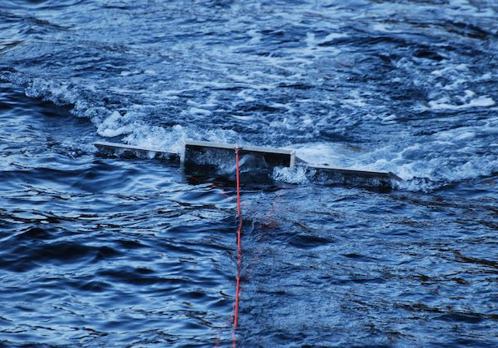
Let’s commit to reducing plastic pollution this Earth Day
22 April 2024

MOU sees ESR and Kiribati join forces to seek science solutions
12 February 2024

How Aotearoa science is supporting global efforts to stop plastic pollution
27 July 2023
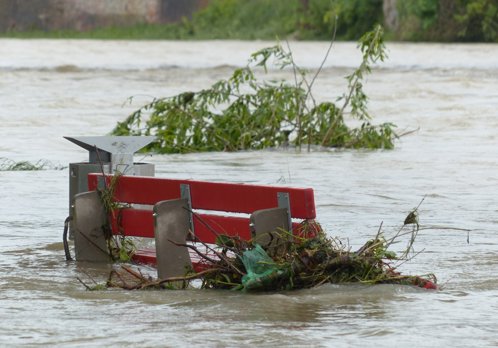
Microbes in motion: why understanding the role of disease-causing microbes is key to addressing environmental emergencies
03 April 2023
Tracking pollution sources in groundwater tracers
14 March 2023
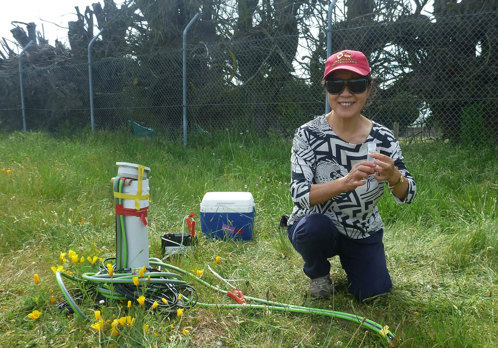
Protecting our freshwaters from waterborne diseases
10 March 2023

On-site wastewater management systems and groundwater quality
07 March 2023
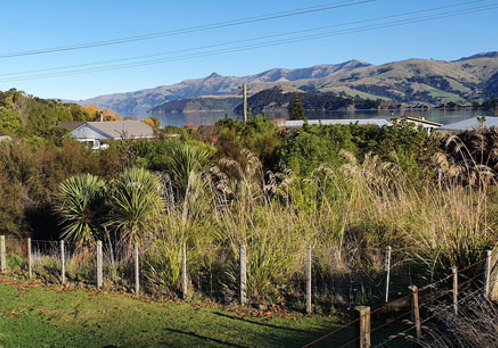
How wastewater could help native reforestation
15 August 2022

What will be the impact of rising temperatures on child health?
08 July 2022
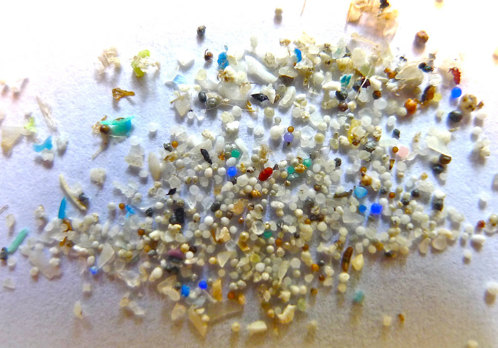
ESR expert on discovery of microplastics in Antarctic snow
29 June 2022
Experts in the area
Experts in Climate change, health & wellbeing

Annette Bolton
Senior Scientist

Sarah Nelson
Senior Scientist

Sudesh Sharma
Scientist